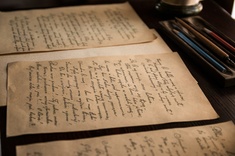
A Treatise on the World #2
First published: Wednesday May 12th, 2021
Report this blog
ATOTW #2
The fact that humans can store our intelligence into everlasting treasure troves such as books and computers in simply remarkable.
Thousands of years ago, the concept of a databank storing any and all information regarding the human race would have seemed trivial and unfeasible. Information traveled by word of mouth and through oral stories and retellings that changed every so often as one added a new detail in to spice the story up. I call books and computers treasure troves because inside of them is loot more valuable than the most expensive diamond. That loot is knowledge. The saying goes that ‘those who don’t know history are doomed to repeat it.’ It’s a wise saying but quite irresolute nowadays with information and history at the tip of the fingers or inside silicon-based microchips. Everything one could ever want to know is easily accessible. With said, I prefer this saying: ‘those who do know history will learn from it.’ The more we as humans learn, the more likely we are to try to improve and build upon what we’ve already done, while embracing our heritage but acknowledging that some of it was wrong.
Even in times before Man itself, the lure of knowledge, the essence of learning, was prevalent in the form of the Tree of Knowledge. The story in Genesis goes that Adam and Eve were told by God never to eat from the Tree of Knowledge. This had the opposite intended effect, as most cautionary warnings seem to have, and the Serpent was only too happy to entice Adam and Eve to betray God and seek out knowledge. They wished to learn, to access the stored knowledge held by the Tree, because they no longer wanted to be kept in the dark. They were punished and the lesson learned was that curiosity is a sin. The same rings true for Pandora. The Olympian Gods gifted her a box and told it contained the evils of humanity inside and to never open it. Once again, curiosity and the yearning to understand what was inside drove Pandora to open the box, thus releasing the ravages of humanity into society, leaving only hope. Curiosity is a sin. And this leads us to the question of how much knowledge is too much? How much does one want to know? Along with the easy access to relevant and helpful knowledge, the open-source world is home to vile creatures; fake doubloons if you will. Fool’s gold. Scammers, stealers, criminals, pedophiles, racists, Nazis, anybody. All anonymous. Luring one in with the promise of something, and producing for them something entirely different. A different set of knowledge. This knowledge, these poison apples, are all stored too. And the poison worms that access them are completely within their right to.
But then again, computers weren’t meant to discriminate, solicit, or entertain the dark web. It was made to store veritable, useful knowledge, acquired by humanity throughout the centuries and imported into the digital so we could all learn. Books too are not unlike treasure either. For centuries, books have been the most reliable method of transferring or communicating information between peoples. Books were created to last, ink was made indelible, messages meant to be read immediately by the receiver or generations later by an archaeologist or a curator. Books were cheap, disposable, utilitarian, ubiquitous, and were beneficial to all. There’s a certain power in books. A certain power knowing that someone wrote this, someone put time and effort into passing on some form of knowledge to the reader. The book stored information, the information contained knowledge, the knowledge inspired awe, creativity, but also pugnacity. A well-written piece of literature can build cities, can educate the masses, can topple empires. A well-written piece of literature is a weapon of war. Doors open and close within books that represent our lives so well, that one must wonder if humans really are more similar to each other than we imagined. And this is why books, and computers by that same token, are beneficial. They keep humanity honest. No longer can we claim to be ignorant when performing acts that degrade the integrity of the human existence. They bring together the world in such a way that even updating a post feels almost too personal, as if thousands of people will see what one says. Everything is catalogued, every piece of knowledge accounted for, the ancient disparity of cultural appropriation wiped away, old philosophers held in the throes of defeat in thinking their sciences would never be known by future generations recognized and applauded for their work.Storing intelligence, knowledge, and information, storing those gold coins in the treasure chest, is absolutely essential if society is to run smoothly for the next thousand years. With this stored intelligence, we have the tools to succeed. We have the knowledge to keep us embattled when the going gets tough. But, most importantly, we have the information needed to help us teach ourselves new things, help us learn new things, and to help us pass on all the things we’ve learned to future generations; not by word of mouth, but by books and databanks that are always there to access, always with more space to add, and always everlasting. Ages will pass us by, but the collective knowledge of humanity will live on, and that is truly remarkable.

It's quite amazing that whatever we do will go through generations; not only do we get valuable information, but it's a reminder that we're working for everyone ahead of us as well. If we made a list of catalysts for societal development, literature would be near the top.